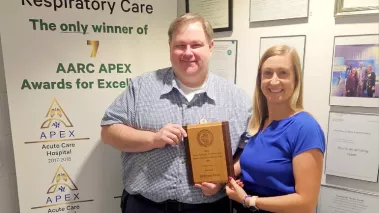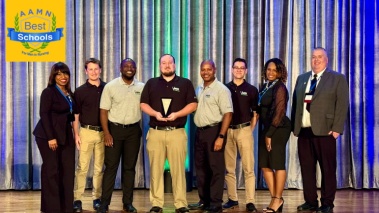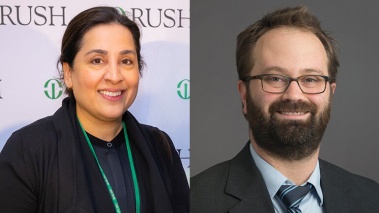Faculty help keep employees healthier, company costs down
Health care access remains a difficulty for millions of Americans, particularly those most in need, despite the Affordable Care Act’s mandate that employers of a certain size must provide health insurance options to their workers.
A partnership between a Chicago-area business and the RUSH University College of Nursing Office of Faculty Practice has provided one group of workers not only free health services, but advocacy for care.
The RUSH clinic at airline caterer Flying Food Group’s Flying Food Servair O’Hare International Airport location is staffed by three Rush nurse practitioners and assisted by nursing and nurse practitioner students. The clinic administers a number of direct health care services and education initiatives to the 450 employees, and the results have been striking.
A recent study that AON Consulting performed for Flying Food discovered that per-employee health insurance costs are significantly less at the O’Hare location than at Flying Food’s 20 other kitchens, even though it has the highest average employee age, says Ellen Pritsker, communications director for Flying Food Group.
Pritsker adds that these kind of results have inspired the company to expand the Rush clinic model to some of its other major locations.
“Our employees truly appreciate the quality of care and the convenient, on-premises location of the clinic,” says Steve Kershner, general manager of the O’Hare kitchen. “There is a respectful and trusting connection between our employees and the clinic staff.”
For Sheila Leen, APN-BC, one of the nurse practitioners at the clinic, the benefits of health care at a job site are obvious — and go beyond cost for employees.
“They feel like someone cares about them being healthy,” says Leen. “They say it every time I’m there, ‘Thank you so much. You guys are so great and take such good care of me.’”
Transporting health care
Employees at Flying Food Servair ORD work hard, cooking and catering food for international flights. Because it’s focused on the airline industry, the kitchen is a 24-hour, seven-days-a-week, 365-days-a-year operation, with the majority of workers on the production line, along with cooks, drivers and managers.
Production line workers and drivers are paid hourly. Though they are offered health insurance through the 2015 Affordable Care Act employer mandate, many live in areas without easy access to health care providers, says Angela Moss, APN-BC, MSN, RN, assistant professor in the College of Nursing and another of the nurse practitioners at the clinic.
These circumstances were well understood years before by the company’s founder, Sue Gin, who passed away in September. Gin was a longtime member of the RUSH Board of Trustees and first approached the College of Nursing in 2009 about offering free, on-site health care to employees at her O’Hare kitchen.
Today, the RUSH clinic at Flying Food Servair ORD provides care for chronic and acute complaints. RUSH nurse practitioners also handle employee drug screening, administer flu vaccines, and provide a wide range of health coaching and healthy living seminars.
Just as important, the nurse practitioners help the employees navigate the health care system. With more than 20 languages spoken at the O’Hare facility, communication can be daunting for some employees, says Moss. Nurse practitioners help coordinate and make primary care and specialist appointments for them.
The partnership seemed natural for RUSH, adds Moss, who also directs the College of Nursing’s Office of Faculty Practice. “It helps promote our vision of social justice — community outreach and helping to decrease health disparities,” she says.
As its name suggests, the OFP creates opportunities for RUSH nursing faculty to provide direct patient care while they satisfy state clinical hour requirements for their nursing certifications and licensure. College of Nursing students also have the chance to interact with real-life patients.
The office currently partners with 19 nonprofit organizations in the Chicago area, including Heartland Health Centers and the Rehabilitation Institute of Chicago. Flying Food Group is its first for-profit corporate partner, with the Rush clinic situated inside the company’s facility near O’Hare.
Sheila Leen says that through such close contact, a bond forms between faculty and employees.
“I get to see the same people over and over, so I get to know them a little bit on a personal level,” she says. “It just feels great to be able to help them, even if it’s something minor, just the fact that you’re helping them feel better.”
Holistic health care
Opportunities such as the Flying Food Servair ORD clinic also offer Rush nursing students a chance to meet required clinical hours for their programs while being exposed to diverse patient populations.
Hannah Leavitt, RN, is a student in the Adult-Gerontology Primary Care Doctor of Nursing Practice program, as well as a nurse in a private practice at Rush. She’s cared for employees at the clinic since January and has found the chance to work with a different patient population valuable.
Last spring, Leavitt also began a small-group health education project aimed at employees with hypertension. Those who sign up get counseling on healthy living strategies such as diet, exercise, and stress management and are monitored over a 12-week period for improvement.
Employees have been very open to the effort, Leavitt reports, including some who’d previously been undiagnosed with high blood pressure.
Leavitt says she’s already brought her experience from the O’Hare clinic into her current work as a nurse. It represents a shift in thinking.
“This has just opened up a whole new idea of what taking care of people means, because I think in this role you’re really taking care of the whole person, not just what they’re coming in for that time,” said Leavitt. “You’re talking about their financial situation, their family, and their home and work life."







